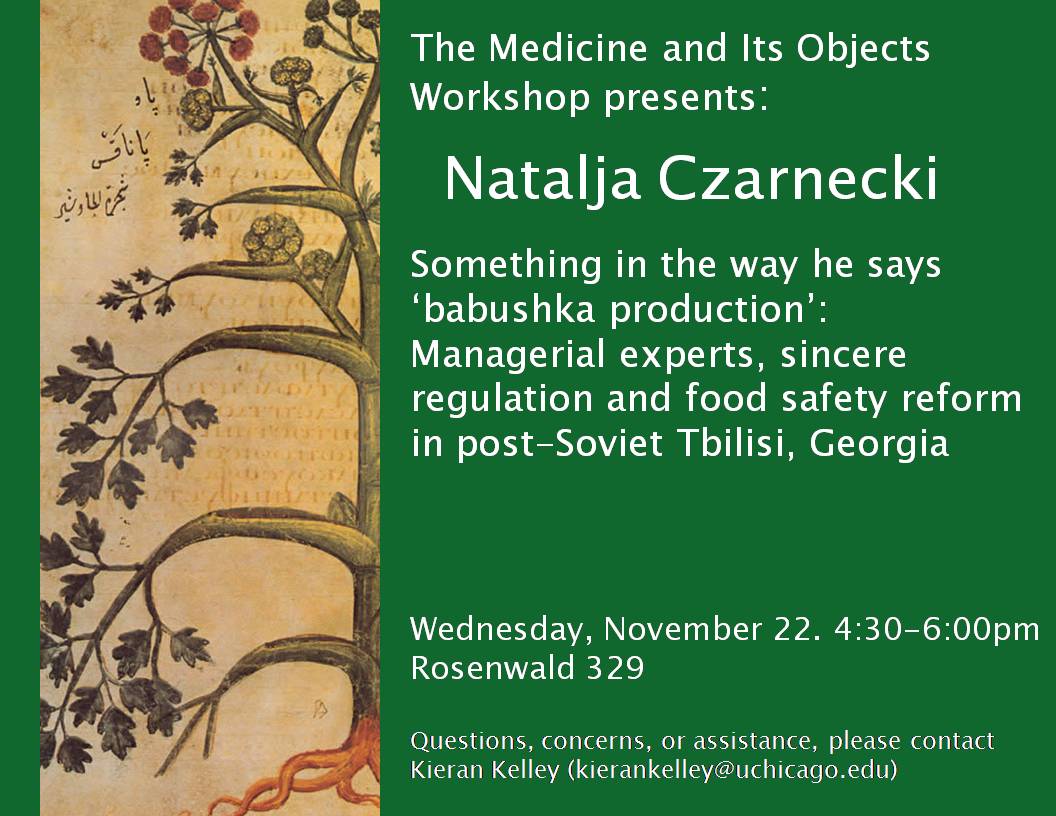Wednesday, November 22, 4:30-6:00pm. Rosenwald 329
The Medicine and Its Objects Workshop presents: Natalja Czarnecki (Anthropology)
Something in the Way He Says ‘Babushka Production’: Managerial Experts, Sincere Regulation, and Food Safety Reform in Post-Soviet Tbilisi, Georgia
with opening comments by Eugene Raikhel (Comparative Human Development)
In 2014, Georgia and the EU signed an Association Agreement, after which the Georgian National Food Agency, a department of the Ministry of Agriculture, began a process of “harmonizing” its legal food safety codes in accordance with those of the EU and of global organizations such as the Food and Agricultural Organization of the United Nations (FAO) and the World Health Organization. In this context of regulatory reform, this chapter offers an ethnographic account of the making of sincere, regulatory authority – here embodied in the figure of the “managerial expert” positioned within a state bureaucracy, the National Food Agency. By comparing different feminizations of the Georgian food-producing countryside as invoked and imagined at sites of my fieldwork in Tbilisi between 2013 and 2016, I hope to demonstrate the moralized politics involved in contemporary discourses around the objects and limits of transnational food safety regulatory regimes’ claims to trustworthiness.
I will examine the kind of feminization of the countryside emergent in a day-long conference on the “Future of Food Safety in Georgia,” wherein EU and global regulatory experts organized and moderated a discussion on regulatory policy and responsibility between Georgian state and private-sector interests. In this idealization, the countryside (embodied by “small-scale family farmers”) is understood in variably gendered ways, depending on the position from which it is invoked. According to EU and other transnational experts at the conference, in paternalistic terms: vulnerable and in need of care and reform; fertile but cheap, lacking in relative market value; and inexperienced. To the Georgian experts and to other experts who attended the conference from former socialist Eastern Europe, this paternalistic characterization of the countryside is different in its terms of moral valuation; it is in need of “care” and perhaps archaic, but it is also deeply familiar, an object of masculinized affection.
The Georgian food safety manager-expert emerges as someone in a particular kind of “proximate distance” to its object of regulation, managing his/her position as oriented to both the authority of technocratic codes emanating from the EU, but also sincerely caring about his/her very familiar object of regulation, here the pastoral countryside. I will discuss what these processes of gendering might tell us about the kind of moral authorities that are claimed and emergent in the politics of transnational regulatory regimes at EU and global “peripheries.”
To receive the paper, or if you have any questions or require assistance to attend, email the workshop coordinator: Kieran Kelley (kierankelley@uchicago.edu)
To subscribe to our mailing list, visit: https://lists.uchicago.edu/web/subscribe/medicineanditsobjects
